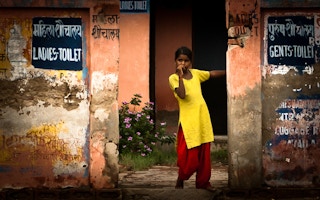On 19 November we celebrate World Toilet Day. While we might take toilets for granted, billions in the world don’t. Toilets and all that is related—loosely called sanitation—play a hugely important role for all of us: not only in our daily lives as we spend time to relieve ourselves, but also for our sustainable, inclusive development. Toilets are crucial for the healthy development of people, not to mention children.
So is sanitation – facilities and services for safe disposal of human urine and faeces includes maintaining hygiene through services such as garbage collection and wastewater disposal. The overall purpose of good sanitation is to provide a healthy living environment for everyone, protect natural resources such as surface water, groundwater, and soil, and provide safety, security, and dignity for people when they defaecate or urinate.
“
Today, 2.4 billion people are struggling to stay healthy, keep their children alive, and work their way to a better future – all for the want of a toilet. Let’s change that.
The facts and figures of toilets (or improved sanitation) from the World Sanitation Program, the World Health Organization (WHO) and WaterAid, among others, speak for themselves.
1. Today, 2.4 billion people or about one-third of the world’s population lack access to improved sanitation—facilities that hygienically separates human excreta from human contact—and 1 billion people still practice open defaecation.
2. In 2012 the WHO estimated that the global economic return on sanitation spending is US$5.50 for every dollar invested – nearly triple the US$2 economic return on water spending.
3. Open defaecation (the practice whereby people go out in fields, bushes, forests, open bodies of water, or other open spaces rather than using the toilet to defaecate) is a leading cause of diarrhoeal death, says the WHO. The diarrhoea death toll stands at around 6,000 a day, mostly young children.
4. In South Asia alone, 1 billion people lack access to improved sanitation and 675 million practice open defaecation, more than any other region in the world.
5. Half of global malnutrition cases are linked to chronic diarrhaea caused by lack of clean water, decent sanitation, and good hygiene, including hand-washing with soap. The extent of the global stunting crisis and scarce access to clean water and decent toilets is having an enormous impact on the future of millions of children suffering from malnutrition.
6. Without improved sanitation facilities and awareness, the risks of infections or other illnesses from faecal sludge or wastewater are extremely high. Just 1 gram of faeces can contain 10 million viruses, 1 million bacteria, 1,000 parasite cysts, and 100 parasite eggs.
7. Hand-washing with soap after using the toilet is one of the most effective and inexpensive ways to prevent diarrhoeal diseases and pneumonia. This simple act can reduce the risk of diarrhoeal disease by up to 47 per cent, but only if it’s done consistently.
Research shows that globally less than one-fifth of people currently wash their hands properly at critical times, and only 19 per cent of people wash their hands after using the toilet or changing a child’s diaper. Diarrhoea and pneumonia, two major illnesses that are transmitted this way, together kill an estimated 1.7 million children every year.
To wash your hands properly, make sure you scrub your hands with soap for 20 seconds, or the time it takes to sing “Happy Birthday” twice.
8. According to Target 2 of the Sustainable Development Goal number 6 on sanitation, by 2030 we should achieve access to adequate and equitable sanitation and hygiene for all and end open defaecation, paying special attention to the needs of women and girls and those in vulnerable situations. This makes sanitation a global development priority.
9. In India alone about 550 million people defaecate in the open, which accounts for more than half of the people in the world who practice open defaecation. Indians excrete close to 65,000 metric tons of faeces into the environment each day. This results in 188,000 annual deaths of children under five from diarrhoea. India loses 6.4 per cent of GDP—US$53.8 billion—due to poor sanitation on a yearly basis. These findings are based on 2006 figures, but a similar magnitude of losses is likely in later years.
Under Prime Minister Modi, the government wants to eliminate open defaecation by 2 October 2019, the 150th birth anniversary of Mahatma Gandhi, by spending US$29 billion to construct 120 million toilets in rural India.
10. What are we doing? ADB’s sanitation portfolio of US$1.6 billion since 2006 is mostly focused on big centralised sewer systems. As it’s impossible to implement large-scale sewerage systems throughout Asia and wastewater treatment still needs increased coverage, we need to look into implementing local systems and solutions.
ADB collaborates with the Bill and Melinda Gates Foundation to increase Faecal Sludge Management solutions in the Asia Pacific region since 2013. ADB’s work in faecal sludge management has increased significantly since, and the future looks promising. Today, investments in non-sewered sanitation solutions are ongoing in Bangladesh, Cambodia, India, Indonesia, Mongolia, Nepal, the Philippines, and Sri Lanka. More than the nominal investment value, the remarkable effect this effort has achieved is that it has paved the way for new approaches to tackle sanitation problems.
On World Toilet Day, we must raise awareness and inspire action to tackle the global sanitation crisis, a topic that is often neglected and shrouded in taboos. Today, 2.4 billion people are struggling to stay healthy, keep their children alive and work their way to a better future – all for the want of a toilet. Let’s change that.
Michiel de Lijster is Senior Water Resources Specialist, Sustainable Development and Climate Change Department at the Asian Development Bank. This post is republished from the ADB blog.











